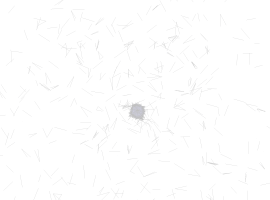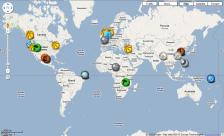Shineanthology’s Weblog
An anthology of optimistic, near future SFArchive for December, 2008
Happiness in the News and Actual Happiness

Just came accross this news item on the site of Dutch newspaper De Volkskrant. I’m translating it here because I think it offers some salient points, and also — somewhat related — as a kind of kick-off for a series of articles I hope to feature here in the new year called “Optimistic SF around the World” (I have approached quite a few people worldwide and received very positive reactions and hope to make it a monthly recurring item: watch this space for more news early next year).
 The title says it all:
The title says it all:
“The Dutch trust each other and call themselves ‘very happy’.”
The Hague — Much more than 25 years ago, Dutch people trust each other, research from the University of Tilburg shows.
The mutual trust between the Dutch people has increased in the last couple of years. Almost two thirds (63 percent) of them answer — to the question if others in general are to be trusted — with a resounding ‘yes’. 25 years ago that percentage was 44.
This is what research, performed by the University of Tilburg, for which 1,500 Dutch people have been interviewed, shows. The research is part of the European Values Study, which compares norms and values of European citizens every nine years. The main report appears at the end of 2009.
Not only the mutual trust, but also the tolerance of Dutch people for things like homosexuality, divorce and abortion increased greatly in the past 25 years. The cause for the high mutual trust is partly due to the relative wealth and partly due to the liberal political system, in which the Dutch are free to make their own choices, according to social sciences professor Paul de Graaf, who leads both the Dutch and European research of trust and tolerance.
Corruption
‘Citizens of relatively poor Eastern European countries trust mainly their family. The rest of the village and the country, including politicians, will take you in at the slightest opportunity, is what these people — who are also much more familiar with corruption — think’, according to de Graaf. ‘In the Netherlands people are relatively well-to-do. In general we don’t think that the neighbours or the politicians are out to get us.’

[Left the graph depicting mutual trust (in blue), personal happiness (in red) as a percentage from 0 to 100; and satisfaction (in green) on a scale from 1 to 10.]
The results are remarkable, because the current government — at its inception — was actually quite worried about the mutual trust. ‘With me personally things are fine, but with society at large not so much so’, would be the general mood. That would be translated as ‘my kids are brought up correctly, but not those of the neighbours’, de Graaf says. However the research shows, he summarises: ‘I’m fine and the others aren’t doing too bad, either.’
Also the so-called ‘hardening of society’, that many seem to have observed since the rise of Pim Fortuyn, would be not quite as bad. ‘That trend does not appear from the numbers’, says De Graaf.
Declining of (consumer) confidence
Although the Tilburg research was done just before the credit crisis erupted, the results would not be much different if it was done right now, the social sciences professor thinks. ‘Only if the recession pulls through and results in massive layoffs, then confidence and mutual trust will decline.’
‘Through all the shouting at websites one would almost think that most Dutch people are unhappy and unsatisfied’, de Graaf adds. But that would be a misconception, as well. In 2008, 56 percent of Dutch people call themselves ‘very happy’. A good 25 years ago that number was 34 percent. De Graaf: ‘I must conclude that the majority of Dutch people are as happy as pigs in muck.’

I tend to have the following discussion quite a lot here in Holland: people complaining that our society has become more harsh (‘hardened’ would be the literal translation), more anti-social. I counter this by calling it bullshit and stating that news reporting — both in the old-fashioned paper newspapers and online — has become more sensational and focussed on horror stories, because these sell better. It’s a cynical trend — probably ages old already, but becoming so much more apparent as the global community becomes more and more interlinked — that distorts (our view of) reality. Same with our feeling of safety: again the mass media (and sometimes the government, as well, unfortunately) tries to paint a picture of our society going down the drains and the streets becoming more unsafe by the minute. And again I have to call bullshit: I’m not saying it’s safe everywhere, but much safer than we are led to believe, even though the above research does not show this directly.
This research provides some evidence for my point of view: contrary to the false perception spread by the media (who have an agenda: bad news sells!) life in the Netherlands has been getting better. And here’s my prediction for 2033: in another 25 years it will get even better (yes: even if the near future — aka the credit crisis — looks bleak. But we’ve overcome the oil crisis, the internet bubble, and more).
Finally, as a reference, a map: “A Globel Projection of Subjective Well-being: the First Published Map of World Happiness” (check out the original BBC article, and the article at Technovelgy, which also has a “Happy Planet Map” that includes the impact on the environment, and shakes up the whole ranking. Yes, things are just very complicated). From 2006:

(UPDATE, 21-01-2009): according to the latest Eurobarometer survey of the European Union (via de Volkskrant), the Dutch are the most content Europeans (followed by the Swedes and the Danes). A staggering 92% of the Dutch considers their current situation as ‘good’.
Good news from around the globe, part 1
Just to show that — despite ongoing wars and fights in Afghanistan, Iraq, Somalia, Congo and street protests in Athens, the credit crisis and more — there are also positive developments in this beautiful world of ours, and these are mostly underreported:

First, good news for biodiversity: treasure trove of new species found in the Mekong Delta (CNN).

The preliminary work on the space elevator moves onwards: recent conventions in the USA, Japan and the Benelux, with the latest progress report on the tether (and its possible material) just out.

Also, in the real world, President-elect Barack Obama appoints Nobel Laureate Steven Chu as Secretary of Energy, and calls — on a press conference last Monday (December 16) — green energy a ‘national mission’.
Steven is uniquely suited to be our next secretary of energy as we make this pursuit a guiding purpose of the Department of Energy, as well as a national mission.
Then there’s Free Press releasing broadband stimulus proposals, designed to turn around the economy, also endorsed by Marty Kaplan on the Huffington Post.
The Grapevine, part 5
Early on it seemed a slow week (longer than a week, actually, partly due to sickness on my part) on the grapevine, but of late things are picking up somewhat:
- Charles A. Tan (and if all goes well you’ll see more of him around this place) sends some love with a short mention here;
- The Sci-Fi Gene blog makes a few cogent remarks about the tension between positive and negative SF;
- And How to Get Inspiration pings back;
- Gord Sellar asks if there is some Optimism, Anyone?;
- Fantastic Review‘s Aaron Hughes drops a quick aside to Shine as it recommends Jason Stoddard’s “Willpower” (online at Futurismic , and now already snatched up for Rich Horton’s Unplugged: the Best of Online Fiction);
- Colleen Anderson mention both Shine and Catastrophia as Writing Antithesis;
- (Belated update): I see that SFWA mentions Shine in their monthly market bulletin of December;
There are — so far — two more interviews upcoming, although only one will be online. Also, I have it from good sources that there will be an article on SHINE in an upcoming issue of the BSFA‘s Matrix Online (which has been a bit quiet of late: I certainly hope this changes).
The Interlinked Universe, part 1
 Via a roundabout way that includes a mixture of both social life and business, I chanced upon a book called “Liberation Biology: The Scientific and Moral Case for the Biotech Revolution” by Ronald Bailey, which looks at the future of biotechnology in a positive light: better health, longer lifespans, and no gray goo (and a reviewer stating: ‘the book adds some balance to a debate that has been dominated in recent times by exaggerated risks and overblown fears’. Sounds familiar, right?).
Via a roundabout way that includes a mixture of both social life and business, I chanced upon a book called “Liberation Biology: The Scientific and Moral Case for the Biotech Revolution” by Ronald Bailey, which looks at the future of biotechnology in a positive light: better health, longer lifespans, and no gray goo (and a reviewer stating: ‘the book adds some balance to a debate that has been dominated in recent times by exaggerated risks and overblown fears’. Sounds familiar, right?).
Following through Ronald Bailey, I found he works as the science editor of Reason Magazine, part of the Reason Foundation (linking to libertarian — or libertarian-like — organisations doesn’t automatically mean that I fully agree with them. Keep in mind, though, that for SHINE I am looking for stories that are optimistic or imagine innovative solutions, and I hope [expect] to be surprised with unexpected viewpoints, and challenged by contrary thinking. Therefore I conscientiously try to read outside of my comfort zone regularly).
On a sidetrack, there was a review of the book on the Innovation Watch website. That website is very interesting, especially the links on its ‘Future Pages’ column: Green Heroes, Idealog (New Zealand idea site), The Social Times, and more.
All these websites see the future as highly interesting, complex, but also doable, as something we can still make. Typically, none of the ‘Future Pages’ links on Innovation Watch refer to SF. Is nobody in the SF community getting the feeling that SF is being overtaken left, right and centre? Good thing that I’m an optimist: I see this as an opportunity. There is a huge potential audience out there interested in SF: in relevant SF.
It makes me wonder about this interlinked Universe, and the power of getting people together through social websites (or the social semantic web as John Breslin on Cloudlands has it). And then you get these tidbits via Twitter from FreePress.net:
The Brookings Institution estimates that each percentage point increase in broadband adoption results in nearly 300,000 jobs each year.
Check it out (quote is from the second page, second paragraph). Who said the economy is dead? It’s in recession, but might hopefully turn towards actual business instead of self-serving castles in the sky.
UPDATE: it seems that President Obama (or one of his advisors) has been paying attention to the report of the Brookings Institute:
“It is unacceptable that the United States ranks 15th in the world in broadband adoption. Here, in the country that invented the Internet, every child should have the chance to get online.”
Anyway, the above is what I mean when I FaceBook and Twitter that a strange kind of focus can broaden your horizons.
Kindred Spirits, part 2
Two kindred spirits — or ‘partners in crime’, if you wish — from a definitely non-paper nature:
- Futurismic: a very open-minded, collective blog that explores the near future and also publishes fiction, quite often fiction with an optimistic tone. Most recently “Willpower” by Jason Stoddard, but do check out their fiction archive for more examples;
- Earth 2100: a CBS TV show asking for solutions.
Let this sink in: a major TV network is actively soliciting ‘solutions for change‘, saying “You can imagine a better tomorrow for our planet.” In the meantime, the majority of the SF community balks at trying to come up with innovative, inventive approaches to solve our current problems, saying it’s either not SF’s job to do that, or feeling much too depressed to turn to a pro-active mindset. 
This bears repeating: if SF won’t try to become relevant, someone or something else will become relevant instead of it. To quote Jason Stoddard: “Science fiction doesn’t become obsolete, it just turns into alternate history.” Remember how cyberpunk — in the eighties — had to do an immense catch-up with the quickly developing computer technology that most SF was hugely ignoring at the time? How cyberpunk was sorely needed to make SF relevant again?
I’ll end with a paraphrase of my own: IIRC a reviewer back in the sixties said that Philip K. Dick made most European existentialist writers look like ‘navel-gazers in a cul-de-sac’. We are now reaching an ironic role reversal: a multi-media project of a major network (and how SF fans love to claim that written SF is superior to media SF) is now making most current SF novels look like ‘escapists in a frightened flight forward'(*).
(*) = Yes, there are exceptions, and I’m well aware of them. They are so much in the minority that they’re akin to voices of sanity lost in the distracted and downbeat crowd.
The Elephant in the Room: a foreshadowing
Inevitably, when we are looking for root causes to address our current problems, we need to face the elephant in the room.
Overpopulation.
Many people seem to think it’s not such a problem anymore, because it’s not in the news. Think again: it is in the news, constantly, but that news refers to the effects of overpopulation (food & water scarcity, wars, climate change, and more). But if we don’t find ways (humane ways) to reduce population growth then most of our solutions will basically fight symptoms, and not address causes.
A graph:



































